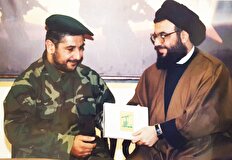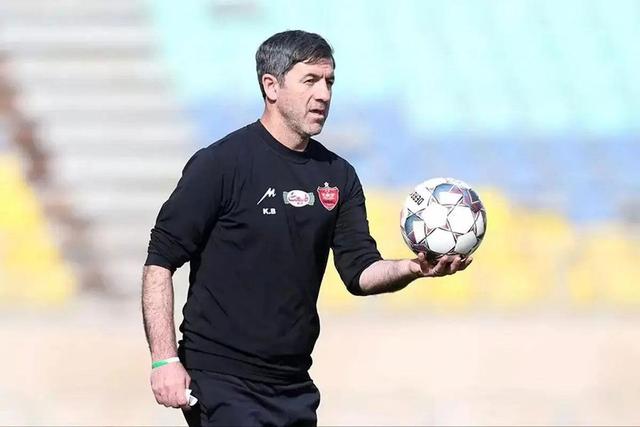Who is Marwan Barghouti and why won't Israel release him?
Who is Marwan Barghouti and why won't Israel release him?

The ceasefire talks aimed at ending Israel’s genocide in Gaza have led to the release of nearly 2,000 Palestinian prisoners in exchange for 20 Israeli hostages.
But one Palestinian was absent from the list: Marwan Barghouti, who rose to prominence as a top Fatah official and is Israel’s most high-profile prisoner.
Barghouti is the most popular Palestinian politician, according to opinion polls, and is regarded as being able to command unity across Palestinian society.
But he has been imprisoned in Israel since 2002, serving five life sentences for his alleged role in murders during the Second Intifada.
Here, Middle East Eye explains Barghouti’s importance and what he could mean for the future of Palestine.
How did Barghouti enter politics?
Marwan Barghouti was born on 6 June 1959 in the West Bank village of Kobar, a poor, rural Palestinian community. One of seven children of a manual labourer, he had just turned eight when Israel began its ongoing occupation of the West Bank amid the 1967 Arab-Israeli war.
Family members recount how his political awareness was formed from an early age, not least when Barghouti saw Israeli soldiers storm his village and shoot his dog.
During his mid-teens, Barghouti joined Fatah, led by Yasser Arafat, and the biggest group within the Palestinian Liberation Organisation. At this time, Fatah operated as an underground armed movement, frequently fighting Israeli forces occupying the West Bank.
At 18, Barghouti was arrested by the Israeli authorities, and later said that he was beaten and tortured by the Israeli arresting officers.
Barghouti told The New York Times in 2017: “An Israeli interrogator forced me to spread my legs while I stood naked in the interrogation room, before hitting my genitals.
“The interrogator mocked me afterward, saying that I would never procreate because people like me give birth only to terrorists and murderers.”
Convicted of taking part in insurgent activities against the Israeli occupation, he spent the next four-and-a-half years in prison.
Following his release in 1983, Barghouti enrolled in Birzeit University outside Ramallah to study history and political science. He became a student activist and quickly rose within Fatah, facing several more arrests for activist activities before Israel deported him to Jordan in 1987.
Months later, in December 1987, the First Intifada began and continued for five years. During this period, Barghouti was confined to rallying international support for the rebellion.
Barghouti remained in exile until 1993, when his return to the West Bank was negotiated as part of the Oslo Accords peace process.
What did Barghouti do during the Second Intifada?
In 1994, following his return to the West Bank, Barghouti became a deputy to Arafat within Fatah’s innermost circle.
Fatah was now engaging with Israeli officials openly, following the mutual recognition agreements negotiated by the Oslo Accords. But the expanding Israeli settlements and travel restrictions cemented by the accords left many Palestinians disillusioned with the peace process.
The 1995 assassination of Israeli Prime Minister Yitzhak Rabin, who had signed the accords, by an Israeli further exacerbated tensions.
With Arafat increasingly blighted by the piecemeal accords he had negotiated, Barghouti’s profile grew as unrest swelled across the occupied Palestine.
On 28 September 2000, Likud leader Ariel Sharon provoked Palestinians when he stormed the courtyards of Al-Aqsa Mosque, one of the holiest places in Islam. It sparked the Second Intifada, which was to last five years and in which Barghouti was a major leader.
Ahmad Gloneim, a former member of Fatah’s Revolutionary Council with Barghouti during the Second Intifada, told MEE that during this period, “Barghouti began to be seen as a figure very close to the Palestinian people”.
“He wasn’t the kind of leader who could spend his time travelling from capital to capital. He led demonstrations in a T-shirt and trousers, and was widely seen as a family man and a normal citizen,” Gloneim said.
By the end of 2000, the Second Intifada had escalated from stone-throwing and civil disobedience to armed confrontation between the Israeli military and Fatah’s Al-Aqsa Martyrs Brigades, and other Palestinian factions.
Whether this move toward violence occurred under Barghouti’s direction is uncertain. Regardless, by 2002, Barghouti was a key target for Israeli forces, narrowly escaping several assassination attempts and spending long periods in hiding.
Known for his calm demeanour, Barghouti once left hiding to visit his family. Gloneim, who was with him, remembers warning of an approaching Israeli tank. Barghouti replied: “Be quiet, you’ll scare the kids.”
After suicide bombings and sniper attacks by Al-Aqsa Martyrs Brigades rocked Israel, Barghouti was tracked down through a wiretap and arrested by Israeli authorities.
Tried in an Israeli court, Barghouti was convicted of planning attacks that killed five people and was sentenced to five life sentences for murder. Barghouti has long denied that he controlled Al-Aqsa Martyrs Brigades, a loose alliance of military groups linked to Fatah.
Disputing the legitimacy of Israel in the occupied Palestine, Barghouti offered no formal defence while also rejecting any link to the attacks.
An inquiry by the Inter-Parliamentary Union found that “numerous breaches of international law" occurred during the trial.
Nimer Sultany, reader in public law at the School of Oriental and African Studies in London and editor-in-chief of The Palestine Yearbook of International Law, told MEE that Barghouti faced a political trial.
“Barghouti's trial highlighted the Israeli legal system’s criminalisation of the Palestinian resistance and its struggle for freedom from occupation and apartheid.
“Although Barghouti was the defendant, the real target was Yasser Arafat and the Second Intifada. Israel has long sought to stigmatise Palestinian leaders and activists under the labels of terrorism and criminality.”
When Yasser Arafat died in 2004, Barghouti - the man long positioned as his heir - was in a maximum security Israeli prison.
In 2006, in his final TV interview to date, Barghouti discussed the charges with Britain’s Channel 4 News.
“The Israelis consider everyone who opposes the occupation as a terrorist, but it’s not true. I don’t think the Israelis are suitable and qualified to describe people as that.”
What has happened to Barghouti since?
Barghouti has been imprisoned in Israel since 2002, shuffled between maximum security facilities. He has faced long periods of solitary confinement, including one lasting three years.
Upon his release from solitary confinement, Barghouti began teaching university classes in prison.
In 2010, his PhD in political science was accepted by Cairo University (his lawyer smuggled out his thesis on Palestinian democracy, one page at a time).
In 2017, while at Hadarim prison, Barghouti led 1,000 Palestinian prisoners in a hunger strike over human rights abuses by Israel.
In an op-ed for The New York Times, Barghouti wrote: “Israel has established a dual legal regime, a form of judicial apartheid, that provides virtual impunity for Israelis who commit crimes against Palestinians, while criminalizing Palestinian presence and resistance.
“Israel’s courts are a charade of justice, clearly instruments of colonial, military occupation.”
Like many Palestinian prisoners and detainees, Barghouti’s prison conditions have worsened since the Hamas-led attack on southern Israel on 7 October 2023, according to his family and other inmates.
They say that Barghouti’s books were confiscated and his food and water rationed, causing him to lose 10kg.
His access to family and legal visits has also been further restricted, with senior Palestinian figures accusing Israeli authorities of subjecting Barghouti to “isolation, torture and attempts to coerce, humiliate and beat him, putting his life in danger".
In August 2025, a 13-second clip emerged of far-right Israeli National Security Minister Itamar Ben Gvir threatening Barghouti in his cell.
In the video, which was condemned by the United Nations human rights chief Volker Turk, Ben Gvir tells Barghouti: “Whoever messes with the people of Israel, whoever murders our children, whoever murders our women, we will obliterate them.”
The clip marked the first images of Barghouti in almost a decade.
In September 2025, Barghouti was beaten unconscious by eight Israeli prison guards while transferring prisons, according to Palestinian detainees released under the prisoner swap deal the following month.
The Asra Media Office, which covers Palestinian prisoner issues, said that Barghouti “lost consciousness and suffered fractures in four ribs as a result of the beating”.
What does Barghouti support?
It is hard to discern Barghouti’s views on recent political developments, given that he has been barred from interviews throughout Israel’s genocide in Gaza.
But he has long advocated direct rapprochement with Israeli officials and has supported the two-state solution.
While imprisoned, Barghouti has learned fluent Hebrew and English, allowing him to engage with politicians from all sides.
Former Likud Finance Minister Meir Sheetrit, who negotiated with Barghouti in the years following the Oslo Accords, told The Economist in 2024: “He supported peace, totally. Real peace with Israel. We became really friendly.”
In his final interview in 2006, Barghouti told Channel 4 News that he had urged Hamas to participate in democratic elections instead of armed struggle.
Referring to the murders and killings of Israeli civilians during the Second Intifada, Barghouti said: “Nobody can justify killing civilians, women and children anywhere in this world.
“They should be outside of the game, in Palestine or in Israel."
He added: “It’s a crime to kidnap journalists, or to kidnap foreigners. I condemn that, and hope they will not repeat that.”
Instead, he said: “Palestinians must give a chance to any international [mediation] efforts, regional efforts, and we will do that.”
But Barghouti also maintained: “The Palestinian people have the full right to resist the Israeli occupation.”
What has been said about Barghouti?
Calls for Barghouti’s release have been frequent during the past two decades, both in Palestine and beyond.
He commands the respect of the leadership of Hamas, the political rival of Fatah, which has long advocated his release.
During the 2011 prisoner exchange that secured the release of Yahya Sinwar, an architect of the 7 October attacks, Hamas also sought Barghouti's freedom. Israel refused.
Hamas again called for Barghouti’s release during hostage-prisoner exchange negotiations in October 2025, as did mediators Egypt and Qatar.
But Barghouti is perhaps the most valuable of all the Palestinian prisoners held by Israel.
A source close to Barghouti’s family told MEE that mediators, including US envoy Steve Witkoff, signed off on a prisoner list that included Barghouti, before his name was unilaterally removed by the Israeli Prime Minister’s Office at the last minute.
According to Israel’s Channel 14, Barghouti's freedom is a red line for Ben Gvir, who has long opposed the two-state solution in favour of Israeli annexation of the West Bank, Gaza and East Jerusalem.
Ben Gvir could imperil Netanyahu's government if he pulls his MPs from the governing Likud coalition.
Yet several leading Israeli politicians have called for Barghouti to be freed. In 2007, Shimon Peres said he would pardon Barghouti if elected, only to renege on the promise when he was elected later that year.
More recently, intelligence figures such as former Shin Bet internal intelligence head Ami Ayalon and former Mossad foreign intelligence director Efraim Halevy have called for Barghouti’s release.
In an interview with Israel’s public radio in February 2025, Halevy said: “Barghouti is popular with his people, he has a clear position, he speaks Hebrew well and can negotiate, all of which qualifies him to lead a new path.”
What now for Barghouti?
No date has been set for Barghouti’s release. And with the remaining Israeli captives freed from Gaza as part of the ceasefire deal, Palestinian groups now have less bargaining power to push for the release of Palestinians in Israeli jails.
Overseas, there are calls for his release. In the UK, for example, both the Green Party and the Liberal Democrats have separately raised his case with British Prime Minister Keir Starmer.
But many in Israel and Palestine would rather he stay in jail.
He is certainly regarded as an electoral threat to Palestinian Authority President Mahmoud Abbas, who is hugely unpopular and who turns 90 in November.
And for Israelis who support annexation of the West Bank , Barghouti’s support of a negotiated two-state settlement is regarded as a threat.
Arab Barghouti, Barghouti’s son, told MEE that recent assaults on Barghouti in prison represent a clear threat to his life and that only pressure from the international community would ensure his survival.
“We’ve already lost 76 Palestinian political prisoners inside prison, and we are not going to wait for my father to lose his life.
“This is a unifying figure, a leader that is trusted by all the Palestinian people, and that is exactly why he represents a threat to the current Israeli government.”
















